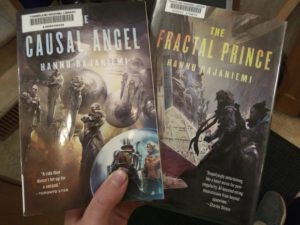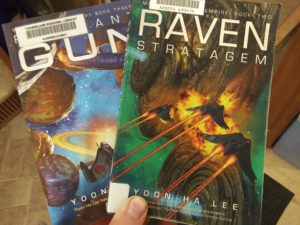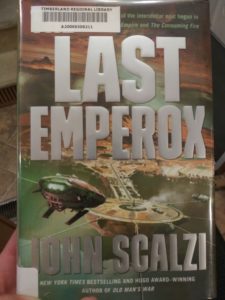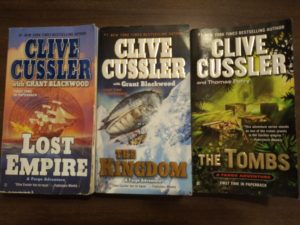During late September I went digging around my files and library website and found three trilogies I had forgotten about, but wanted to finish, and a stack of books I was reading through at the time. So, I went on a reading spree and finished all the books before I entered college at the end of August.
Jean le Flambeur:

This series is now my favorite in the sci-fi mind-bending category. It was unpredictable; every time I thought I had figured it out, something new changed the course. It was enticing how it kept me hooked and uncertain up until the very end. At the same time, the book had some deep questions about love, companionship, and human nature and development.
For example, a character finds companionship and love with a person from the guild, an advanced people who play games, and finds out they were created to be the perfect match for them. At first, she rejects the person, disgusted with the possibility that they created her just to get her to assimilate into the group. But she learns that they really just wanted her to have exactly what she needed, and through some other truths, decides that it doesn’t matter how the person came to be and spends the rest of her life with them happily. It should be noted, the created person is devoted to them, but not robotic, she has her own twerks, opinions, and personality, though it was to make her the perfect match.
The two main characters seem at first to be just tools for a goddess, then trying to free themselves, and end up trying to save the universe. Jean le Flambeur is a master thief, and over time he made copies of himself for purposes. The story follows a fragment that was let out of prison for a mission, as he travels her learns about himself, his own plan for himself, loved ones he left behind, and over the course of events, changes himself to be different than his precessors and succeeds. But as soon as he does, he realizes he played into the plan of the enemy…
Great story, satisfying ending. Read it.
Machineries of Empire:

This series was exciting for its thick storytelling and description of a universe totally unlike ours. They used mathematics to make formations in battles that gave certain abilities to the fleet, abided by laws and traditions that supported a mathematical calendar that allowed most of their society and technology to run and had ships that were organic and sentient by origin. It had a good mix of predictability and surprise.
These two were books two and three of a triology. Earlier I read the first book, Ninefox Gambit, but just never continued the story for quite some time until I remembered them again.
The Interdependency series:

Now this book had a very interesting universe, it had parallels to our world. Though really, the book is exploring a possible future for humanity. It’s an empire built around these wormholes that allow ships to travel quickly to other systems. Only one of the systems is a planet that can sustain life. The rest of the vast empire, the Interdependency, is reliant on each other to survive, hence the name Interdependency. Each system is focused on producing what it can and distributes it to other systems in return for food and material they can’t make. But then the wormholes start collapsing, dun dun dun…
—————— May 22, 2022 Update
I went on to finish the trilogy by John Scalzi by reading books 2 and 3, The Consuming Fire and The Collapsing Empire. They were well done and ultimately ended well. I highly recommend the trilogy.
Fargo Adventures:

These three books are from the Fargo Series, books 2-4. Very similar to book one, which I wrote about earlier. The pattern and rhyme of the books are near identical, just new content. Book four changed to a different co-author, which is noticeable. Characters’ introductions came late in the book, and the book became a tidbit sexual. Mainly it is the twist of history, the facts and fiction, that make the stories engaging.
Stand-Alone Books:

These books, I won’t go into much. The two on the left I read because they had interesting summaries and I wanted to better understand girls… The Alice Munro one though… It got overly weird and I couldn’t quite find myself to believe that it is a realistic representation of girls growing up…
Common sense is a collection of letters, I believe, published by Thomas Paine on what he considered to be common sense concerning government, the relationship with Great Britain, and the status of the Crown/King of Great Britain.